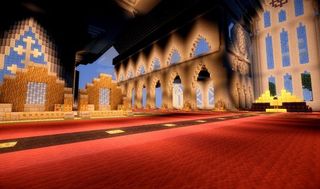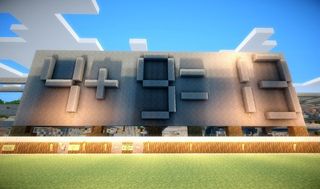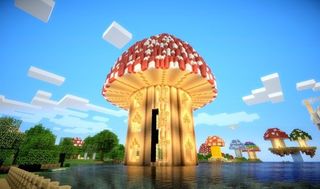Blockbuster - The Making of Minecraft

“With Wurm, Rolf and I wanted a game in which the player actually affected the world. MMOs are usually just parallel singleplayer campaigns basically – there is not much interaction going on. So we wanted something where it's actually like: here's a world, have fun. Well, not 'have fun' actually. Work really, really hard. Then it becomes fun, because you're invested in it.”
Mass-market appeal, however? That's not really Wurm's thing. It could not be a day job. Instead, Notch earned his crust at King.com, a casual games company that has since become the second largest game developer on Facebook.
“I started working as their eighth employee, I think. I worked there for five years and made my own games on the side. Jakob joined something like a year after I got there.”
“Me and Markus just hit it off,” recalls Jakob Porsér, a fellow developer at King and a future co-founder of Mojang. They make a pleasingly asymmetrical pairing: Notch wry and demure, Jakob open and effervescent. The latter now helms the development of Scrolls, a card battler whose origins lay in the discussions and debates Notch and he would have over lunch.
“But as King got larger, it started to be a problem for people doing games in their spare time,” Notch says. “They didn't want people to make anything that could compete. So I left and joined jAlbum [a developer of photo gallery software]. They were totally fine with me doing stuff in my spare time. And then, months later, Minecraft was making a profit.”

Minecraft as it exists today was not quite the initial plan, however.
“It was going to be Dwarf Fortress, basically, but in a Rollercoaster Tycoon type engine. Real 3D but with a fixed isometric camera. I'm a big fan of Dungeon Keeper, so I thought I'd do some kind of 'possess spell' where you could actually look at your constructions in first person – it wasn't meant to be the way to play it. I added that and everything got really blurry because the textures were low-res. I thought: I won't have this mode because it's too ugly. And then I saw Infiniminer, which is basically just blocks with huge pixels instead of filled textures. I thought, oh I can just do that – and then it basically turned into the same game.”
PC Gamer Newsletter
Sign up to get the best content of the week, and great gaming deals, as picked by the editors.
Minecraft owes a very clear debt to Infiniminer, a game by Zachtronics, later the developer of SpaceChem, but they aren't really the same game – certainly not any more. The shared block-building fundamentals were just the first stage of considerable iteration, the goal always being the RPG-infused survival mode.
“My idea was to make a fantasy world interactive, and probably some of the things we did for Wurm carried over,” Notch says. “I tried thinking a lot about instant gratification. When you pick up a block, what does it sound like? If it's not fun walking around, you're not going to have a fun game.”
Minecraft went from preliminary dabbling to paid alpha very quickly, a pragmatic approach to online retail that has served Mojang well through its subsequent endeavours.
“I thought, if I don't charge I'll never get paid,” Notch explains. “If I wait until the game is done, it's never going to be done because I won't have the money to sustain development.”

He found exactly the right place to pitch his half-made game: TIGsource gave him access to a community of developers who were not only willing to offer constructive feedback but whose influence quickly made the game viral. Word spread that Valve were completely obsessed with Minecraft. Little of the game functioned outside the free build mode – which at the time was more a symptom of the ongoing development than an intended feature – but Notch was soon making a lot of money.
“It was very difficult for me to trust the numbers,” he says. “Like: this is just going to stop selling any day. So I stayed with jAlbum, working two days a week for nine months, even though I didn't really have to because the money I got from Minecraft was way bigger than my salary. I just wanted to play it safe. I grew up in the suburbs of Stockholm, not having much money, and I never really cared because I didn't have any expensive hobbies. And since I didn't really use the money [from Minecraft], I didn't really feel like I was rich.”
One increasingly obvious outlet for this wealth was to establish a company, employing extra hands to smooth out Minecraft's ongoing development, and enabling the long-anticipated collaboration with Jakob.
“And then Valve contacted me,” says Notch. “It was interesting. I got to do programming tests and stuff. They said, 'Well it's obvious you're self-taught. You're going to have to learn some new habits if you're going to work in large groups.' Which I absolutely agree with. But the timing wasn't right at all. I needed to really give Minecraft a chance.”
Most Popular

